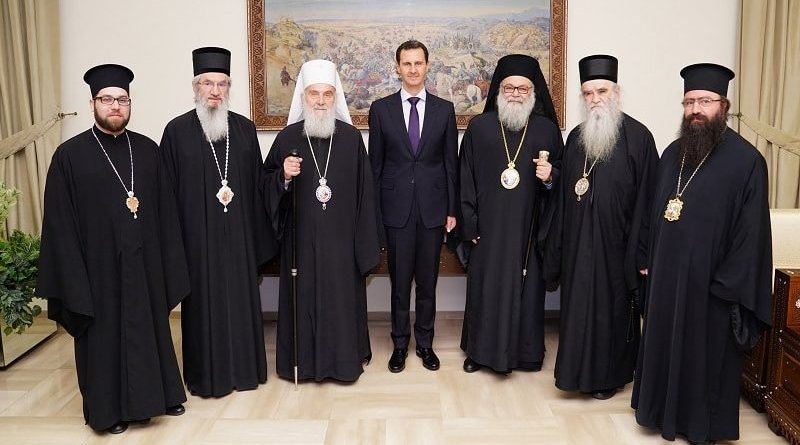Serbian Patriarch Sparks Controversy By Meeting Syria’s Assad
By Maja Zivanovic
An Orthodox Church delegation including Patriarch Irinej and the Montenegrin bishop Amfilohije met Bashar al-Assad on Monday evening, with the Serbian religious leader and the Syrian president exchanging warm words over Serbia’s stance on Kosovo and the ongoing conflict in Syria.
Syrian news agency Sana reported that the meeting in Damascus was also attended by the Greek Orthodox Patriarch of Antioch and All the East, John X.
According to the Serbian Orthodox Church website, Patriarch Irinej “highly praised the principled and firm support of President Bashar al-Assad for Serbia” on the issue of Kosovo, whose independence Serbia refuses to recognise.
Assad compared his country to Serbia in terms of what he said were foreign attempts to undermine its sovereignty, a reference to Western backing for Kosovo’s independence and for rebel forces in Syria.
“President al-Assad stressed that what Syria and Serbia have been exposed to in terms of foreign interference and attempts to undermine their sovereignty and undermine their social fabric, and the two countries’ peoples steadfastness in the face of such attempts, constitutes a solid basis for building a national dialogue and cooperation that establishes the groundwork for a long-term relationship that serves the interests of both peoples,” said the Sana report.
Irinej meanwhile spoke of the “determination and perseverance of the Syrian people to maintain unity with regard to terrorism”.
The Serbian delegation also visited the monastery of Saint Thecla, which was destroyed by ISIS forces, according to a church press release.
In Serbia and Kosovo, the Assad meeting sparked divided comments on social networks.
Many in Serbia recalled that Assad and his Syrian forces, with Russian backing, have used prohibited weapons such as cluster munitions, incendiary devices and chemical weapons, and argued that the patriarch should not meet him.
The meeting was also condemned by Kosovo’s Foreign Minister Behgjet Pacolli, who called the Serbian Patriarch to visit places where Kosovo Albanians were killed “instead of again visiting a war criminal”.
“Shame on him!” Pacolli said in a message on Twitter on Monday evening.
However, some commentators in Serbia defended the visit, saying it was normal for presidents to meet church representatives when they visit a foreign country.
Serbian theologian and religious education teacher Mladen Aleksic suggested that the patriarch’s visit to Syria, where he also met representatives of the Syriac Orthodox Church, could lead to a meeting of all Orthodox church leaders to discuss the Ukrainian Orthodox Church’s split from Russia.
The Ecumenical Patriarch – the Archbishop of Constantinople – recognised the independence of the Ukrainian Orthodox Church in January, cleaving it from the powerful Russian church after four centuries of ties.
“Arab Orthodox Christians are not satisfied with the actions of the Constantinople Patriarchy. In the context of these ecclesiastical and geopolitical events, I believe that the leaders are considering the possibility of convening the All-Orthodox Assembly [the heads of all Orthodox churches] to discuss the Ukrainian crisis,” Aleksic told BIRN.
Aleksic said that many local Orthodox church leaders think that the Ukrainian issue should be resolved at a meeting of the All-Orthodox Assembly, an idea which is rejected by the Constantinople Patriarchy.

